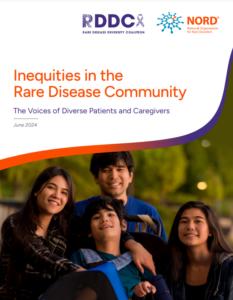The National Organization for Rare Disorders (NORD) and the Rare Disease Diversity Coalition (RDDC) have unveiled the findings of a groundbreaking national survey aimed at illuminating the barriers faced by underrepresented patients with rare diseases and their caregivers. This pioneering research involved over 2,800 participants, revealing critical insights into the challenges of accessing necessary healthcare.
The joint report, titled «Inequities in the Rare Disease Community: The Voices of Diverse Patients and Caregivers,» defines underrepresented individuals by the following criteria:
- Below the federal poverty limit versus above the federal poverty limit
- Black, Indigenous, People of Color (BIPOC) versus non-BIPOC
- Hispanic/Latino versus non-Hispanic/Latino
- LGBTQIA+ versus cisgender/heterosexual
- Rural versus urban/suburban residence
One key finding reveals that a staggering 50% of respondents reported feeling overwhelmed by the demands of managing life, care, or caregiving responsibilities. This data point highlights the significant emotional and logistical burdens placed on individuals and families within these communities.
Another deeply concerning finding is that more than 20% of people in underrepresented communities delayed or skipped care because they lacked basic resources of food and shelter. The issues of poverty and income inequality should be understood as critical to the rare disease community; there is a dire need for proactive outreach and assistance to low-income individuals and families with rare diseases.
Other insights in this report illuminate barriers to genetic testing, inadequate insurance plans, and a lack of engagement and inclusion in daily life. For each of these areas, NORD and RDDC have provided recommendations for future surveying, programming, and outreach to be done by patient advocacy groups, healthcare providers, insurers, and others whose work impacts rare patients. Where possible, we have linked to existing resources for patients and patient organizations facing these concerns.
Jenifer Waldrop, Executive Director of the RDDC, highlighted the critical nature of these findings: «The findings from this survey serve as a wake-up call. Over 43 percent of the respondents were from underserved communities, and we found that more than 20% of them delayed or skipped care because they lacked basic needs like food and shelter, a reality that demands immediate attention. We must work together to create a healthcare system that truly accommodates the needs of every rare disease patient and caregiver.»
Pamela Gavin, CEO of NORD, further underscored the importance of these findings: «This first-of-its-kind survey illuminated many things we know too well about patients with rare diseases and their caregivers—that they are overburdened by their symptoms and the costs of medical care, that they are often excluded from public life, and that in many ways our medical system is leaving them behind. But what it also showed is that these barriers to care are more pronounced for people of color, people in rural areas, non-English speakers, low-income individuals and families, and the many members of our community with disabilities. Any policymaker, healthcare provider, or insurer reading these results should understand that critical action is needed. The good news, which we detail in the report, is that there are solutions—but it will take all of us to make them happen.»
The survey’s formulation and review process involved meticulous crafting, drawing on insights and recommendations from the RDDC’s Patient and Caregiver Working Group. This collaborative effort resulted in a mixed-method study encompassing qualitative and quantitative questions, designed to capture a comprehensive snapshot of the participants’ experiences. The insights from this survey are intended to inform future policies and interventions aimed at eliminating disparities in the diagnosis, care, and treatment of rare diseases. For more detailed information on the study methodology and findings, read the full report here.



